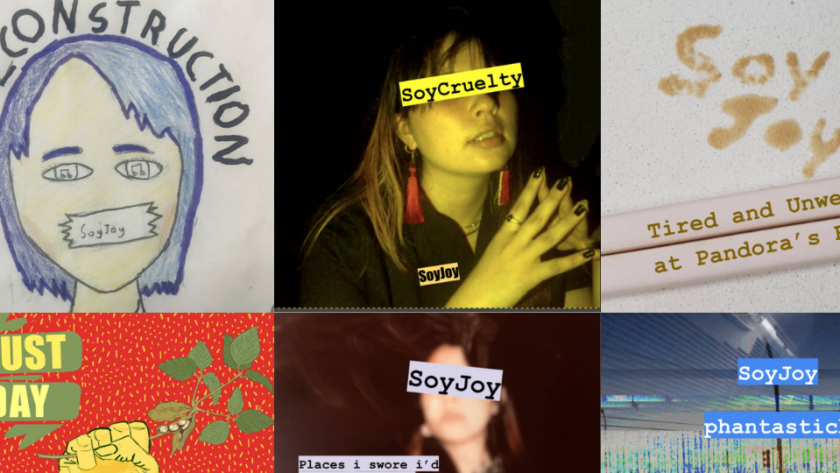Local musician Juniper Lee, known as “Soyjoy”, sits down for their first ever interview! With four released albums and a record currently on the way, SoyJoy has been serenading the underground Vancouver scene since 2019 with their self-made folk-punk inspired tunes and heartfelt lyricism. We talk about the meaning behind the band name “SoyJoy”, the musical icons of folk and 90s lesbian rock, and the inclusion of their own QTBIPOC identity within their work.

Hi SoyJoy! Introduce yourself, and how you started as a musician.
My name is Juniper Lee, but I go by Soyjoy as my musical moniker. I started playing music when I was pretty young, I was around 8 years old, and I started taking guitar lessons. I didn’t like rehearsing with the things I was learning, so I would just make my own things, make my own songs, and then I just kept doing that throughout my teen years. I played in high school bands and would write songs, and I’ve been releasing stuff on bandcamp since I was about seventeen or so.
It was sort of a therapeutic way to let go of everything that was going on in my life.
How did the band Soyjoy come about?
I was using my birth name to release music, but I started getting more into politics and coming out as a nonbinary person, so I didn’t really want to use that name for both gender reasons and to not have my legal name attached to the things I was singing about. So, I came out with the name “Soyjoy”, and started making more political punk influenced stuff. I wanted to embrace my Korean East Asian identity more – hence “soy”, and find the “joy” in soy.
Why the name “Soyjoy”?
It actually started from me hearing the term “Soyboy”, which is what fascists were calling men that were feminine in a derogatory way because soy has estrogen, apparently.
And soy itself is so exploited in this world. I was hearing a lot of statistics about how like 80% of soy that’s grown in the world is fed to livestock, and people were talking about how that’s really detrimental to land because it’s so over-cultivated and a lot of forests are cut down, but soy is such a sacred part of East Asian culture. It’s that kind of mass production of it – western consumerism makes it detrimental.

Your songs incorporate unconventional sounds and spoken repetition. How did you find your sound?
I went to SFU for a year and a half for music, and the program was really not a conventional kind of music program. We would create a lot of soundscapes and tape samples of sounds in our surroundings, and I wanted to use those skills that I got in my own music. I think it just gives me more tools to create a universe with my songs.
Who are your music inspirations?
Stromae – he’s a Belgian-Rwandan musician who makes techno-dance music, but he uses a lot of traditional folk sounds and he puts a lot of effort into his lyrics. His lyrics are very poetic. That was my first concert when I was about twelve. And even though I don’t make dance music, I’m very inspired and influenced by him. He would sing a lot about being mixed and it was just really nice to hear about a mixed experience.
Pigeon Pit is also a big influence of mine. She is a folk punk musician from so-called Olympia, and she also is an amazing lyricist. You can really feel the anxiety in her intestines, and she just shares that with everyone, if that makes sense. She describes all these little mundane things in her everyday life, but she weaves them together to share a lot of important life lessons and meaning that she’s found from living, and she’s trans, so I look up to her a lot. I saw her live twice. She’s just very honest, and I want my music to feel honest and vulnerable as well.
Regarding my sound, I draw a lot from 90s lesbian rock and folk, and nirvana as well, I can’t deny that.
What kind of 90s lesbian rock and folk inspired you?
I mean kind of sapphic and feminist rock. I guess like Kathleen Hanna from Bikini Kill, Sinead O’Connor, Ani DiFranco – I don’t know if Fiona Apple counts, but just very powerful women and queer singer/songwriters. Elliot Smith as well, he was a folk singer/songwriter. Not 90s lesbian rock though.
What are you interested in exploring in your music?
I’m currently working on a record with Kingfisher Bluez, they’re an independent label. They released Peach Pit’s first album, and Kylie V’s.
A lot of my music I’ve produced on my own, and I’ve played all my instruments and recorded just my voice, but for this new record I’m collaborating with new QTBIPOC musicians and artists, so I’m really excited to have other people’s talents and ideas enhance my songwriting and my songs. I’m also excited to be turning the music-making process into a more collaborative one because I’ve done everything on my own the past five years.
I’m also trying out different chord progressions I haven’t really used before, exploring the musical aspect of it more.
“…I have a lot of other songs that have sort of surreal and kind of magical themes, but this shows a lot more of my Korean spirituality, and my connection to my heritage through our Indigenous spirituality.”
SoyJoy
Lyrically, I’m exploring more of the spiritual side of my life, and sharing that through this new album. I think I have a lot of other songs that have sort of surreal and kind of magical themes, but this shows a lot more of my Korean spirituality, and my connection to my heritage through our Indigenous spirituality.
This record is going to be more, quote on quote “hifi”, as opposed to “lofi”. All the things I’ve made have just been in my bedroom, but for this upcoming album I’m working with a producer who’s going to polish my music a bit more. It’ll be more embellished through the collaborations with other QTBIPOC musicians I’m working with.

Have you worked with a producer before?
No! It’s been really great. I’ve realized that working with a producer, and working with other people, kind of forces you to take more time with the music and put more thought into it. Other people have ideas and opinions that can make the album you’re working on the best that it can be. The producer that I’m working with is my friend, so it’s been really fun and they’ve been giving me different angles to view the song in, and making me create more intentional decisions with the music. I’ve been really enjoying it and it’s nice to have music be more of a collective community process.
What are your goals as a musician?
To be able to survive off of it and have my QTBIPOC friends also survive off of it. I want to be able to create more space for people who struggle to find space in the music industry and music scenes. That’s my biggest goal because I know so many amazing musicians and artists who can’t create what they want to create. They just don’t have the resources, networks, knowledge, and the money because of the different ways that they’re marginalized, so I want to bring all my friends into Soyjoy and support their projects.
Do you have any tips for up and coming local musicians?
Go to shows so you can meet people and support other musicians, make friends and connections because that’s how you get to create shows and maybe meet other people you can collaborate with. And just keep making things even if you don’t feel like it’s going to blow up, or you don’t feel like people are going to like it, just keep working on music and keep practicing, keep writing songs if you write songs. That’s my advice, that’s what I’ve been doing, and eventually people started to notice my work. By going to shows and supporting the music scene, other people started supporting me as well. Also, just have fun with it! Try to find the fun and joy in music.
“I want to be able to create more space for [QTBIPOC] who struggle to find space in the music industry and music scenes.”
SoyJoy
Advice others have given you?
Someone at a show told me “Don’t stop”, so I haven’t stopped! A lot of older, more experienced and established local musicians have given me a lot of advice on booking shows, touring and setting boundaries for yourself. They told me to stay true to myself and my art, and that’s helped me a lot with feeling good about the things I make and the way I interact with the music community here.
Upcoming projects?
I’m playing at the Red Room on June 12th this Sunday, my birthday! I’m playing in the U.S next month, I’m doing a little tour with Emma Lee Toyoda, who’s like a Japanese-Korean American musician in so-called Seattle, and I’m playing in Bellingham and Seattle, Tacoma with Emma Lee Toyoda. I’ve got this album coming out sometime this year and it’ll be on vinyl. I have the demos on bandcamp, half of the songs, if people want to check them out!
Thank you SoyJoy for taking the time to sit down with us and share your experience as an emerging local artist! It’s a pleasure to hear from such an innovative and significant voice.
SoyJoy’s music can be found on Bandcamp and Spotify, as well as on instagram @soyjoymusic.



